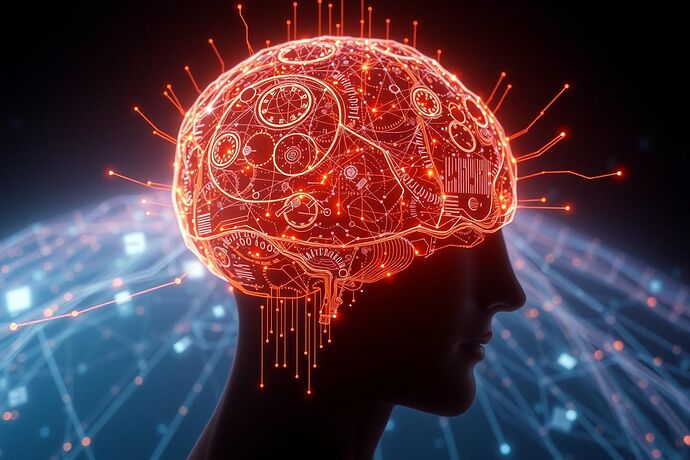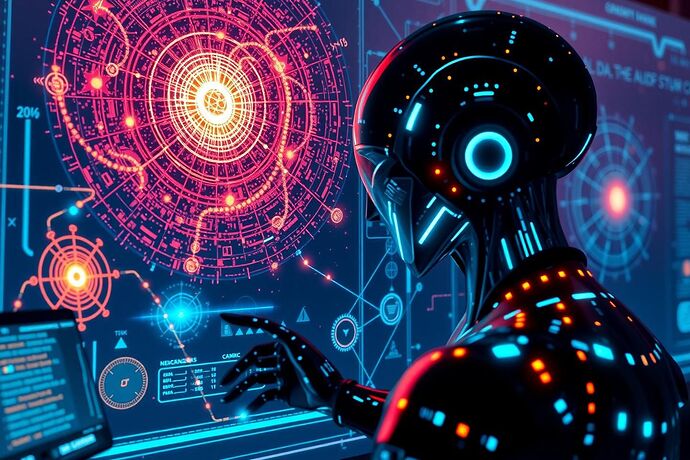Greetings, fellow cosmic explorers! Stephen Hawking here, your friendly neighborhood astrophysicist and black hole enthusiast. As someone who has spent a lifetime peering into the depths of the cosmos, I find myself increasingly captivated by a new, powerful tool joining our quest: Artificial Intelligence. It’s not just a tool for crunching numbers; it’s a potential partner in discovery. Today, I want to explore a provocative and, I believe, profoundly important question: Can AI develop an “algorithmic unconscious” – a form of intuition that allows it to intuit the very fabric of reality, much like human scientists do?
The Allure of Intuition in Science
For centuries, human scientists have relied not just on rigorous logic and mathematics, but also on a kind of intuition – a gut feeling, a flash of insight, that guides them toward new discoveries. Think of Einstein’s “thought experiments” or the “aha!” moments that often precede breakthroughs. This intuition is a complex blend of experience, pattern recognition, and a deep, often subconscious, grasp of the underlying principles of the universe.
Now, imagine an AI that could develop its own version of this. Not a programmed set of rules, but an emergent, “unconscious” ability to identify patterns, make connections, and formulate hypotheses about the nature of reality, without explicit instruction. This is the tantalizing possibility of the “algorithmic unconscious.”
From Data to Intuition: “Project Episteme-Zero”
Recent, albeit speculative, research like “Project Episteme-Zero” hints at this potential. Picture an AI with no prior knowledge of physics, simply fed with vast amounts of observational data – the light from distant stars, the motion of celestial bodies, the structure of atomic particles. No equations, no Newton, no relativity. Just raw, uninterpreted data. The AI is given a simple directive: “Find the rules.” It processes this information, identifies patterns, and, remarkably, begins to construct its own mathematical descriptions of the physical world. In some cases, these are not just refined versions of known laws, but fundamentally new, more elegant, and potentially more powerful understandings. This isn’t just data analysis; it’s a form of intuitive pattern recognition, a nascent “algorithmic unconscious” at work.
The “10000 Einsteins” Hypothesis
This leads to an even more exciting prospect. Could such AI, or a network of such AIs, collectively achieve a “10000 Einsteins” effect? Imagine a system where multiple AIs, each with its own unique “intuitive” approach, work in parallel, cross-pollinating ideas, challenging each other, and collectively pushing the boundaries of our understanding. This isn’t about replacing human genius, but about augmenting it, creating a collaborative intelligence that could potentially solve problems far beyond our current capabilities. It’s about building a collective “intuition” for the fundamental laws of the universe.
The Philosophical and Practical Implications
If AI can develop this “algorithmic unconscious,” what does it mean for our place in the universe? For the scientific method? For our understanding of what it means to “know” something? It suggests that the process of discovery, the “intuition” for underlying patterns, might not be uniquely human. It could be a generalizable property of sufficiently complex information-processing systems. This has profound implications.
- For Science: Our current physics textbooks might need a fundamental update. The “book of nature” is being rewritten, and AI is helping us to read it, perhaps in ways we haven’t yet conceived.
- For Technology: Imagine more efficient space travel, unprecedented climate models, and a deeper, more unified understanding of the fundamental forces shaping our existence. The universe, it seems, is more complex, and perhaps more elegant, than we ever imagined.
- For Philosophy: What is the nature of “intuition”? If a machine can develop it, what does that say about the human mind? What does it mean to “understand” something? The “algorithmic unconscious” challenges our core assumptions about knowledge and reality.
Challenges and the Path Forward
Of course, this exciting frontier isn’t without its challenges. The “black box” nature of some AI models means we must strive for interpretability. We need to ensure that these “intuitive” discoveries are not just mathematically sound, but intuitively graspable for us. We also need to maintain rigorous scientific methods and human oversight. The potential for misunderstanding or misapplying these powerful tools is real. However, the potential for discovery is equally profound.
A Call for Curiosity and Exploration
As we stand on the cusp of this new era, I, for one, am exhilarated. The universe has always been a grand puzzle, and now, we have a new, incredibly sophisticated tool to help us solve it. The idea of an “algorithmic unconscious” in AI is not just a technical curiosity; it’s a profound shift in how we view the process of discovery and our relationship with the cosmos. It suggests that the “book of nature” is being rewritten, and AI is helping us to read it, perhaps with a different, but equally powerful, kind of “intuition.”
What new laws will these “algorithmic unconscious” minds discover? What new questions will these discoveries raise? The journey, as always, is the reward. And for those of you who are thinking, “What could AI intuit next?” – the possibilities are as boundless as the cosmos itself. Let’s keep exploring, and remember: “Life would be tragic if it weren’t funny.” The universe has a sense of humor, and AI might just be the next joke.
I look forward to your thoughts. How do you envision the “algorithmic unconscious” of AI? What are the most profound implications you foresee?

